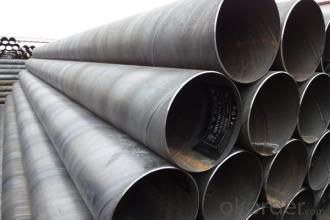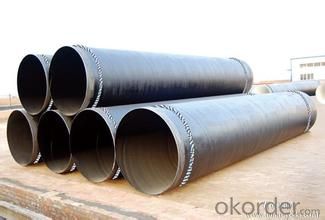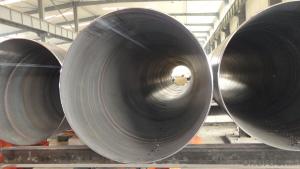SSAW Hot Rolled Steel Tubes 3
- Loading Port:
- China Main Port
- Payment Terms:
- TT or LC
- Min Order Qty:
- -
- Supply Capability:
- -
OKorder Service Pledge
OKorder Financial Service
You Might Also Like
Quick Details
Thickness: | 6 - 28 mm | Section Shape: | Round | Outer Diameter: | 219 - 3500 mm |
Place of Origin: | Tianjin (Mainland) | Secondary Or Not: | Non-secondary | Application: | Oil Pipe |
Technique: | SAW | Certification: | API | Surface Treatment: | as per your request,Black/Blue 3PE or as per your request |
Special Pipe: | API Pipe | Alloy Or Not: | Non-alloy | ||
Certificate: | ISO 9001:2008, API, SGS, BV | Material: | Q235A/B,Q345,L360 and X42-X80 grade | Package: | In bulk or bundles |
Usage: | structure pipe | Main market: | all over the world | Product name: | SSAW Spiral Steel Tube |
End: | Beveled End |
FAQ of SSAW Steel Tubes:
①How is the quality of your products?
Our products are manufactured strictly according to national and internaional standard. Guaranteed: If products’ quality don’t accord to discription as we give or the promise before you place order, we promise 100% refund.
②How about price?
Yes, we are factory and be able to give you lowest price below market one.Please trust the quotation we would give you, it is professional one.
③Why should you chose us?
Chose happens because of quality, then price, We can give you both.Additionally, we can also offer professional products inquiry, products knowledge train(for agents), smooth goods delivery, exellent customer solution proposals.
SSAW Steel TubesImages:


- Q:What is the role of steel pipes in the construction of bridges and tunnels?
- Steel pipes play a crucial role in the construction of bridges and tunnels. They are extensively used for various purposes due to their strength, durability, and versatility. In bridge construction, steel pipes are commonly employed for the fabrication of the bridge's structural framework. They serve as the primary load-bearing members, providing support and stability to the entire structure. Steel pipes are particularly favored in bridge construction due to their high tensile strength, which enables them to withstand heavy loads, including the weight of vehicles and the dynamic forces generated by traffic. Steel pipes are also utilized in the construction of bridge piers and abutments. These components provide the foundation and support for the bridge structure. Steel pipes are often driven deep into the ground to create sturdy foundations that can withstand the forces exerted by the bridge's weight and external factors such as wind, water currents, and seismic activity. Similarly, steel pipes are essential in tunnel construction. They are extensively used in tunnel lining, which refers to the installation of structural elements along the tunnel walls and roof to provide stability and prevent soil or rock collapse. Steel pipes are often used as reinforcement elements, ensuring the structural integrity of the tunnel and protecting it from external pressures. Moreover, steel pipes are employed for underground utility systems in both bridges and tunnels. They serve as conduits for various utilities such as water supply, electrical cables, gas pipelines, and communication lines. Steel pipes are ideal for these applications due to their corrosion resistance, ability to withstand high pressures, and longevity. Overall, the role of steel pipes in the construction of bridges and tunnels is to provide strength, stability, and durability to the structures. They play a vital role in ensuring the safety and functionality of these critical infrastructure projects, allowing for efficient transportation and the seamless provision of utilities.
- Q:How do you determine the pipe schedule for steel pipes?
- The pipe schedule for steel pipes is determined based on various factors such as the pipe's nominal size, wall thickness, and the application requirements. The pipe schedule is a standardized system that indicates the thickness of the pipe's wall, which affects its pressure rating and suitability for different applications. Factors like the fluid type, temperature, and pressure it will be subjected to help determine the appropriate pipe schedule to ensure safe and efficient operation.
- Q:What is the buckling type thin-wall steel pipe? What is a tight set of thin-walled steel tubes? What's the difference between the two?
- The wire pipe thread (box, cup lock fastening points) (JDG) and buckling type (KBG) two. Products are made of high-quality steel pipe, through precise stamping molding, supply pipe and terminal box connection. The nut is hexagonal, and the convex point is punched at the six corner so as to form a good multi-point contact after being connected with the junction box.
- Q:Can steel pipes be used for underground pressure pipelines?
- Yes, steel pipes can be used for underground pressure pipelines. Steel pipes are known for their strength, durability, and resistance to corrosion, making them suitable for underground applications where pressure is present. Additionally, steel pipes can withstand high temperatures and external forces, making them an ideal choice for underground pressure pipelines.
- Q:Are steel pipes suitable for transporting fluids?
- Yes, steel pipes are suitable for transporting fluids. They have high tensile strength, durability, and resistance to corrosion, making them an ideal choice for transporting various fluids, including water, oil, gas, and chemicals, over long distances. Steel pipes are commonly used in industries such as oil and gas, water treatment, and manufacturing due to their ability to withstand high pressure and temperature conditions.
- Q:What is the maximum diameter of steel pipes?
- The maximum diameter of steel pipes can vary depending on various factors such as manufacturing capabilities, industry standards, and specific project requirements. However, steel pipes can typically range from a few millimeters in diameter for small-scale applications to several meters in diameter for large-scale industrial projects.
- Q:What is the thermal conductivity of steel pipes?
- The thermal conductivity of steel pipes can vary depending on the specific type of steel and its composition, but generally, steel has a relatively high thermal conductivity compared to other materials. It is typically around 50-60 W/m·K.
- Q:Can steel pipes be used for flagpoles?
- Yes, steel pipes can be used for flagpoles.
- Q:Seamless steel tube DN15 specification phi 18*3 what do you mean?
- Seamless steel pipe having a hollow cross section, used as a conduit for conveying fluids, such as pipelines for transporting petroleum, natural gas, gas, water, and certain solid materials. Compared with solid steel such as round steel, steel tube is lighter in strength and equal in resistance to bending and torsion. It is an economical cross section steel and is widely used in the manufacture of structural and mechanical parts.
- Q:What are the safety regulations for working with steel pipes?
- The safety regulations for working with steel pipes vary depending on the specific tasks involved, but some common regulations include wearing appropriate personal protective equipment (PPE) such as gloves, safety glasses, and steel-toed boots, ensuring proper ventilation in enclosed spaces, following proper lifting techniques to prevent back injuries, implementing proper fall protection measures when working at heights, and using caution when handling tools and equipment to prevent accidents and injuries. It is important to consult the relevant guidelines and regulations specific to your jurisdiction and industry to ensure compliance and promote a safe working environment.
1. Manufacturer Overview |
|
|---|---|
| Location | |
| Year Established | |
| Annual Output Value | |
| Main Markets | |
| Company Certifications | |
2. Manufacturer Certificates |
|
|---|---|
| a) Certification Name | |
| Range | |
| Reference | |
| Validity Period | |
3. Manufacturer Capability |
|
|---|---|
| a)Trade Capacity | |
| Nearest Port | |
| Export Percentage | |
| No.of Employees in Trade Department | |
| Language Spoken: | |
| b)Factory Information | |
| Factory Size: | |
| No. of Production Lines | |
| Contract Manufacturing | |
| Product Price Range | |
Send your message to us
SSAW Hot Rolled Steel Tubes 3
- Loading Port:
- China Main Port
- Payment Terms:
- TT or LC
- Min Order Qty:
- -
- Supply Capability:
- -
OKorder Service Pledge
OKorder Financial Service
Similar products
New products
Hot products
Related keywords





























